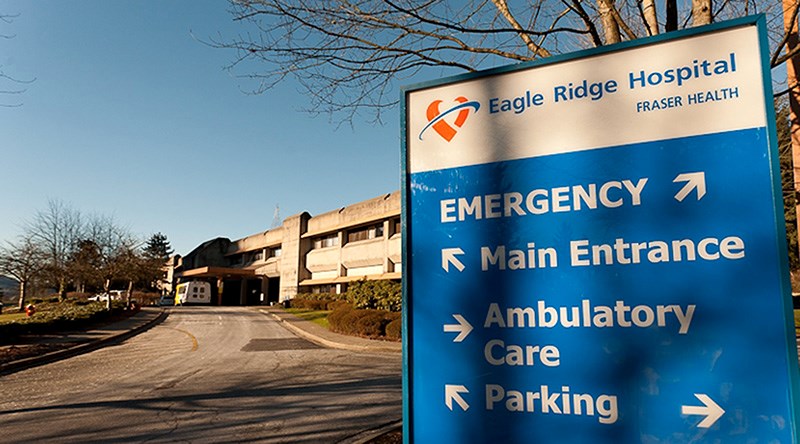Eagle Ridge Hospital’s executive director is crediting hospital staff for initiatives that have resulted in fewer cases of sepsis and quicker hospital admissions.
Data contained in the biannual report of the Canadian Institute for Health Information (CIHI) shows that the Port Moody hospital has cut in half the number of infections resulting in sepsis while the hospital is doing the same or better in other key indicators.
(Sepsis is a life-threatening illness caused by a body’s response to an infection.)
“It’s a great hospital to work in because staff are taking initiative in [dealing with] quality indicators,” Lisa Zetes-Zanatta told The Tri-City News.
For example, ERH has focused on hand washing, preoperative preparation, removing clutter and other moves to cut sepsis rates from 3.5 per 1,000 patients to 1.4/1,000.
As well, the hospital is doing a better job of moving patients out of emergency into regular beds, Zetes-Zanatta said. Now, instead of waiting until the afternoon for moving patients into wards, ER patients are moved in the morning, speeding up the process.
Zetes-Zanatta said she expects to see the change reflected in the number of hours it takes for ER patients to be admitted, posted as 43.6 hours (in 90th percentile) in the CIHI report, which is still below the Fraser Health average of 46.8 but above the national average of 29.3 hours.
(There have previously been complaints about the number of ER patients left in hallways.)
“First thing at 8 a.m., patients are pre-identified to go upstairs and up they go. We no longer wait for people,” she said, noting that discharged patients can wait in a departure area where they can still be seen by a doctor or a nurse, and older patients have access to a geriatric chair for their comfort.
“You want to have people up-seated and mobile because mobility is one of the predictive factors in doing well in hospital,” she said.
And while costs at ERH have risen from $4,465 per bed since 2011/’12 to $5,199, the figure is lower than the Canadian rate of $6,098 and the Fraser Health average of $5,732 per bed. Zetes-Zanatta said the increase is likely due to the fact that ERH is doing more surgeries, which are more costly, and using newer, better technology.
Hospital staff are also looking forward to an emergency room expansion that will provide more room for patients, improve comfort levels, patient treatment and also lower infection rates, she said. Design work is underway for the $27.6-million project that will more than double the number of treatment spaces from 19 to 39.
“We’re really excited about that. That’s going to give us a tonne more capacity. The emergency is the key linchpin to be able to serve people well.”
THE CIHI - WHAT IS IT
The Canadian Institute for Health Information is a data collection system paid for by both provincial and federal health authorities that gathers health information for 500 Canadian hospitals. It was made public online in 2014 and information is posted in the fall and spring. “It’s really to add that transparency to the conversation of how things are going,” explained Kira Leeb, director of health system performance for CIHI. Find data at yourhealthsystem.cihi.ca.
BY THE NUMBERS
Note: these stats are for 2015/’16
• Emergency department wait times for initial
assessment by a physician
ERH — 3.2 hours
• Community medium hospital — 3.1 hours
• Fraser Health — 3.2 hours
• B.C. — 2.8 hours
• Canada — 3.1 hours
• Total time spent in ER for admitted patients
• ERH — 43.6 hours
• Community medium hospitals — 27.8
• Fraser Health — 46.8
• B.C. — 35.4
• Canada — 29.3
• Sepsis rates per 1,000 patients
• ERH — 1.4
• Community medium hospitals — 3
• Fraser Health — 3.9
• B.C. — 4.2
• Canada — 4.1



